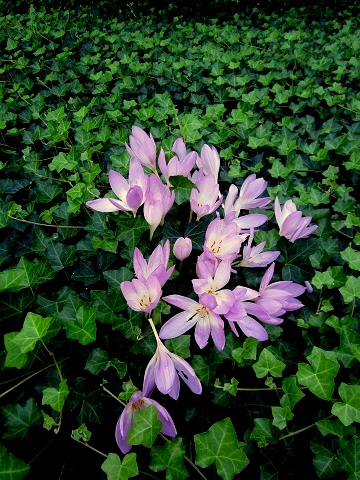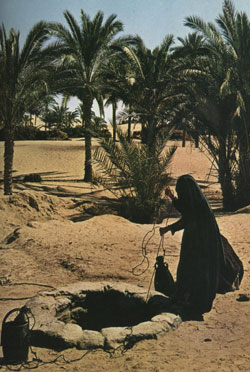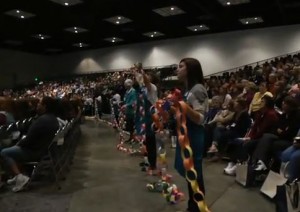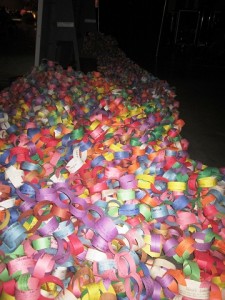Spring, not autumn, is the season for fresh flowers, and we love gathering crocus, lily of the valley, and jonquils into our homes. Fall, on the other hand, is about readying our gardens for winter. Though colored leaves can be striking, fresh flowers are hard to come by…
…unless you live in my neighborhood.
As Jack and I strolled around the block last week, we found a spring-like surprise: brand new blossoms in dramatic purple, pushing up from a tangle of ivy roots and stems. Looking more like Easter than Columbus Day, they made me stop to oooh and ahhh, and I’ve been thinking about them ever since.
All of us have heard the expression, “Bloom where you’re planted,” which is exactly what these flowers are doing. Though that quote isn’t from Scripture, its principle is. No matter what snarling circumstances surround us, God wants each of us to accept our lot in life, or, put more eloquently, to embrace his will.
What if he decides that an extreme hardship is what we need to turn our attention to him? Wouldn’t that “misfortune,” then, be in our best interest? That kind of logic makes us squirm. “It’s not fair!” we say.
All of us want to live on Easy Street. Something deep inside says we deserve that. So why doesn’t God make it happen? If he can do anything, then why doesn’t he choose to make us happy?
- Because each difficulty coaxes us closer to him.
- Because we can demonstrate his sustenance through troubles.
- Because by cheerfully enduring, we can bank rewards for later.
- Because flexing our perseverance-muscles makes us stronger for next time.
- Because living above circumstances is the high-road way to live.
- Because God has told us, “In this, you can please me.”
In other words, the Lord assigns certain hardships to each of us and is keenly interested in how we’ll handle them. When we bloom in the middle of those messes, whether it’s poverty, terminal illness, financial stress, or something else, the beauty and perfume of the resulting flowers can impact many, much like the purple “Resurrection Lily” (or “Surprise Lily”) impacted me. When we’re joyful through suffering, it surprises people.
But there’s a catch. We can’t do it on our own. Cheerfully accepting a “fate” that seems unfair makes our mental scales-of-justice tip. More natural is to run from it, fight it, or try to escape it altogether. From where God sits, however, those reactions go down as losses.
So, to encourage us to bloom against all odds exactly where he plants us, the Lord has told us that one day every believer will indeed have an address on Easy Street. And I’ll bet the blossoms in those yards are going to be out of this world.
“Let God transform you into a new person by changing the way you think. Then you will learn to know God’s will for you.” (Romans 12:2)






